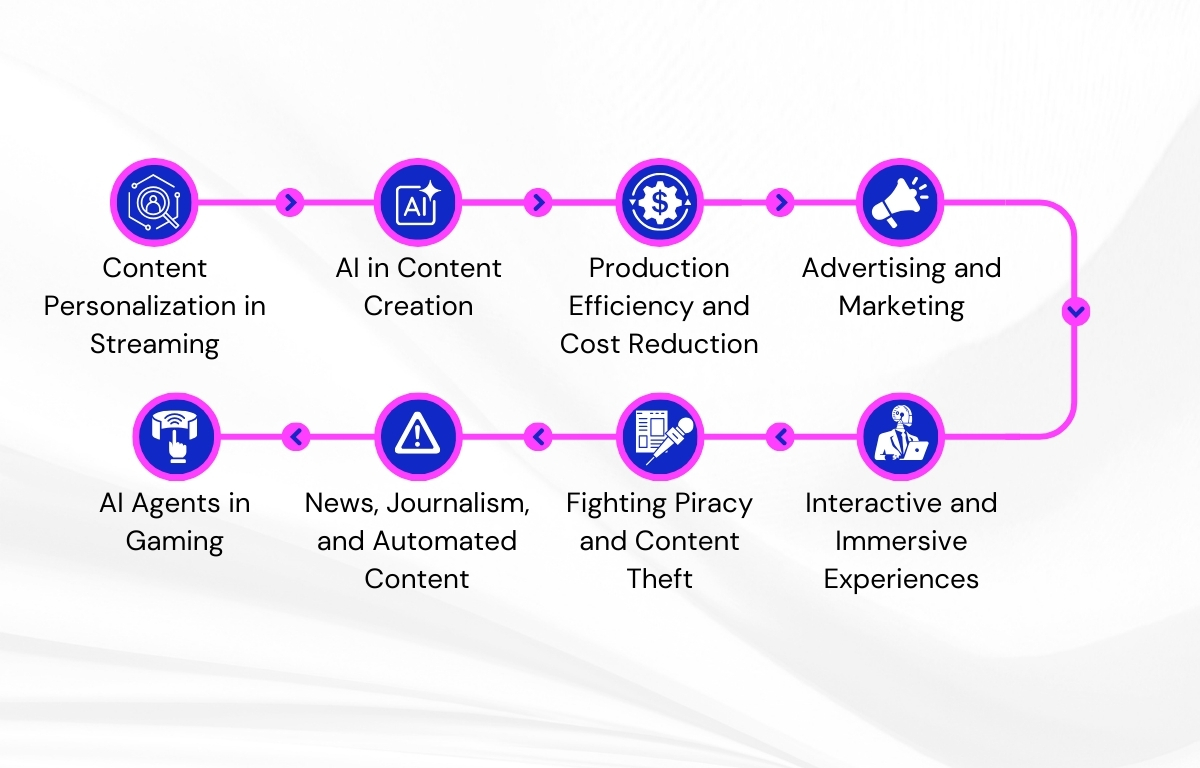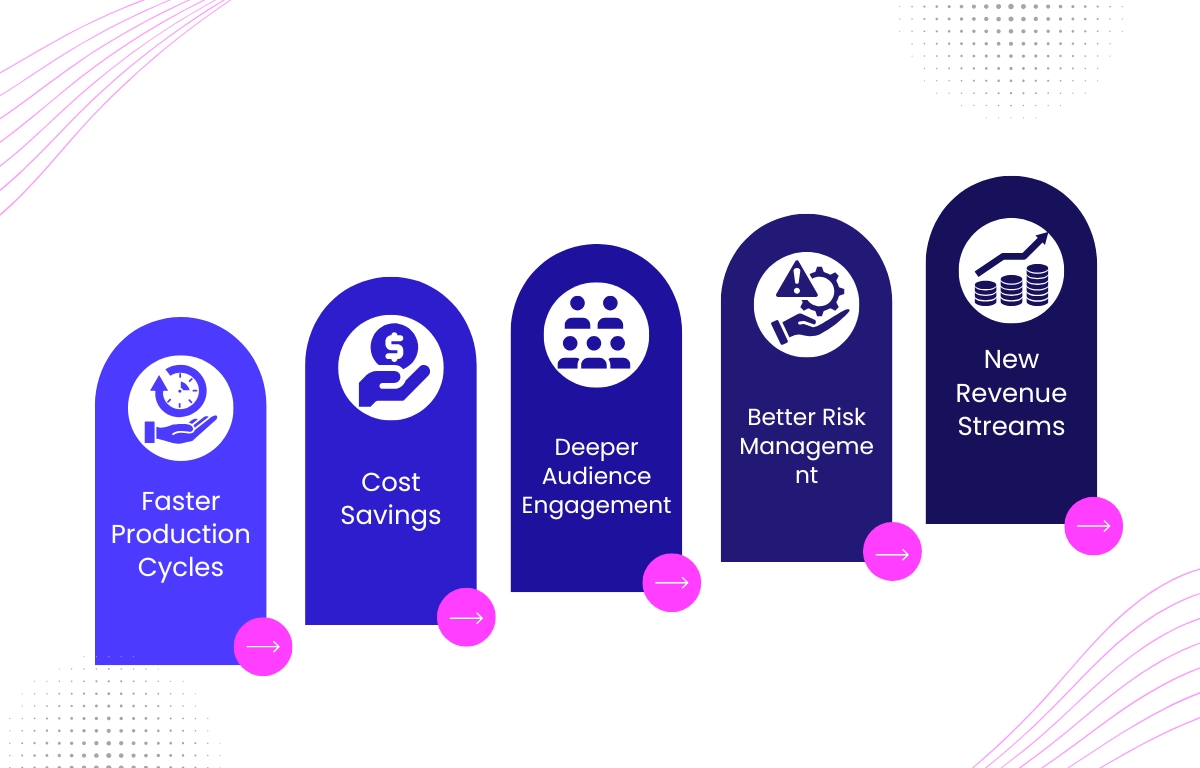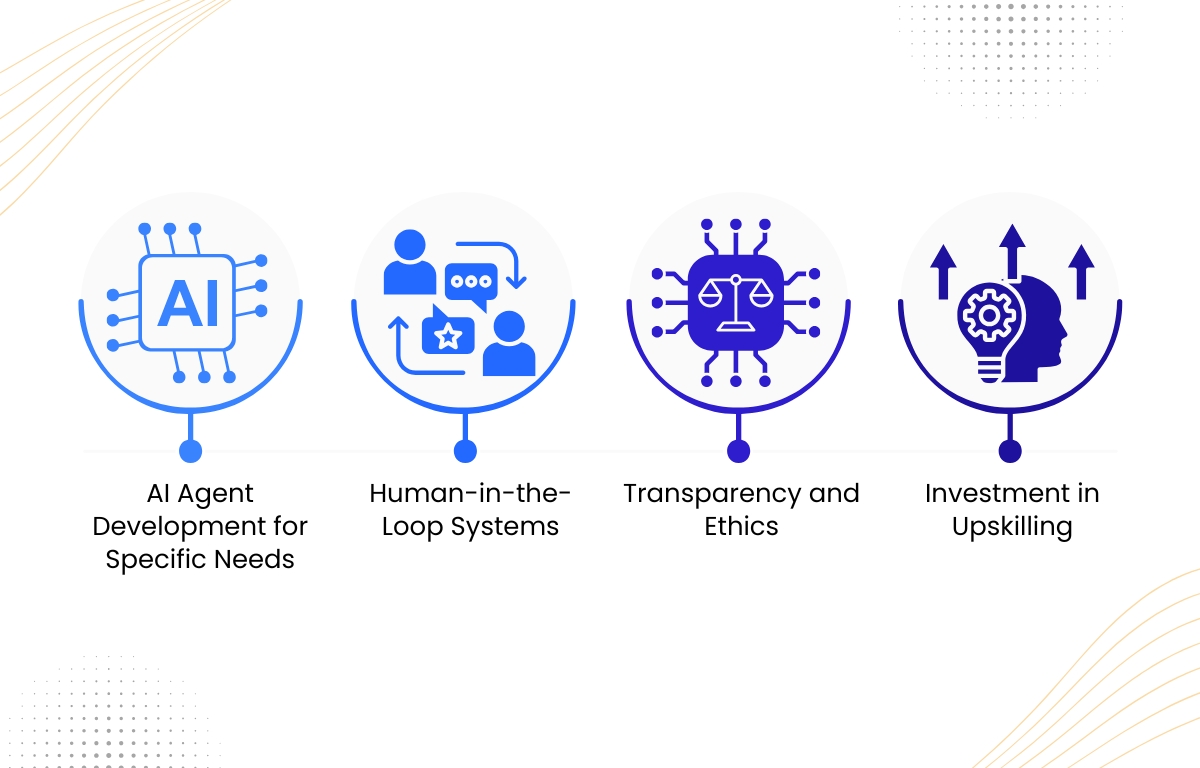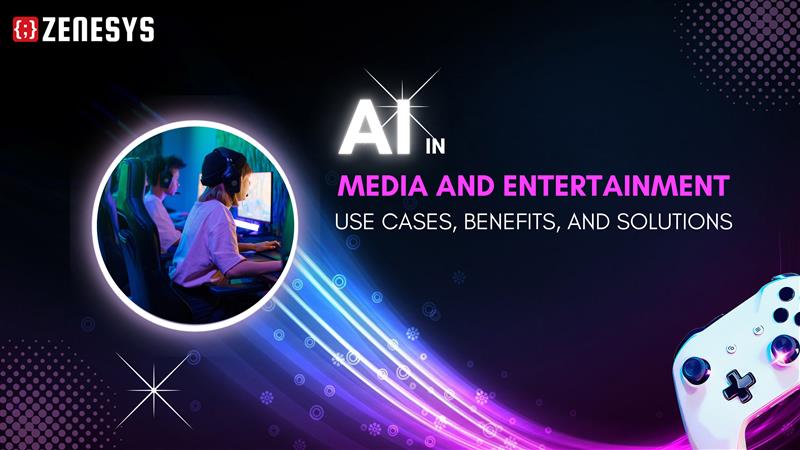The clock is ticking.
Media and entertainment companies that ignore artificial intelligence today are writing their own obituaries for tomorrow.
Why?
Because audiences are no longer waiting. They demand precision, personalization, and speed. And the old ways of creating, distributing, and consuming content simply can’t keep up anymore.
This isn’t theory. This isn’t hype.
The shows you watch on Netflix. The music Spotify recommends. The deepfake videos that spread across social media. The scripts, trailers, and even casting decisions that algorithms are quietly influencing.
This isn’t science fiction. It’s today.
AI is already reshaping how movies are shot, how music is produced, how advertising is targeted, and how streaming platforms keep you watching “just one more episode.”
If you’re in media, broadcasting, publishing, or entertainment and you’re not building with AI yet, you’re standing still while the industry sprints away from you.
Let’s break down the numbers, the use cases, the benefits, and the practical solutions so you can see exactly where this train is heading—and decide if you’re getting on board.
Key Takeaways: Stats That Matter Right Now
- According to Grand View Research, the global AI in media & entertainment market size was estimated at USD 25.98 billion in 2024 and is projected to reach USD 99.48 billion by 2030, growing at a CAGR of 24.2% from 2025 to 2030.
- 71% of executives in entertainment say AI already adds measurable value, mainly in content personalization and marketing efficiency.
- Netflix saved over $1 billion annually using AI-powered recommendations to reduce churn and boost user engagement.
- Virtual production tools like AI-based de-aging and CGI cost-cutting are reducing production budgets by up to 15-20% for major studios.
- AI-driven advertising is 2-3x more effective in engagement compared to traditional targeting.
- Music startups using AI composition tools report output speed up to 10x faster, with reduced reliance on large studio teams.
Why AI in Media and Entertainment Matters Now
Remember when streaming first started taking over cable? At first people shrugged. Then, in a few short years, entire industries collapsed while Netflix, YouTube, and Hulu grew into cultural giants.
AI is the next wave of that disruption.
But this time, the cycle is even faster. Tools once reserved for billion-dollar film studios are now available to indie creators on a laptop. And technology that feels experimental today becomes mainstream by next year.
Here’s the truth:
- Audiences don’t care if content is made “the traditional way.” They care if it hits the right emotional note at the right time.
- Advertisers don’t care if campaigns are brainstormed in a boardroom. They care if AI-driven tools get them better ROI on ad spend.
- Creators don’t care how they make faster, cheaper, and higher-quality output. They care that someone sees their work instead of getting buried in the noise.
The pressure isn’t coming—it’s already here.
Major Use Cases of AI in Media and Entertainment
Let’s get practical. Below are the real use cases driving adoption today, not science fiction.
1. Content Personalization in Streaming
Streaming giants thrive on AI algorithms. When Netflix recommends a show that feels like it read your mind—it’s no accident.
- According to Research Gate, 80% of what people watch on Netflix comes directly from AI-based recommendations.
- These systems don’t just match you to shows. They change thumbnail images, ranking of films, and even the headlines you see based on engagement probability.
- For streaming platforms, better recommendations = higher retention = less churn.
- Platforms like Netflix, Hulu, and Disney+ run on algorithms that predict what you’ll watch next. These aren’t simple guesswork—they’re built on billions of data points from viewing history, device type, time of day, and even micro-behaviors like pausing and rewinding.
2. AI in Content Creation
AI is not just recommending content—it’s making it. From automated news articles, generate AI videos to AI-assisted scriptwriting, AI agents are moving into the writer’s room to perform these tasks.
Companies like Warner Bros. have experimented with AI to predict box office performance based on scripts. Sony used AI to create a movie trailer for Morgan that cut editing time from weeks to hours.
- Music generation tools like AIVA and Soundraw are helping artists compose faster. Some creators say they now produce background scores in hours instead of weeks.
- Script-writing assistants analyze existing hits to suggest narrative arcs, pacing, and dialogue refinements. They don’t write the next Breaking Bad for you, but they offer structure to accelerate development.
- Voice synthesis tech is enabling entire podcasts and ads to be voiced without a human studio session.
But here’s the catch: AI isn’t replacing human creativity. It’s augmenting it. Writers still craft stories. Directors still shape the vision. But AI helps identify patterns, speed up production, and reduce costs. If you’re a creator, AI won’t take your job. Someone using AI will.

3. Production Efficiency and Cost Reduction
Hollywood films run on brutal timelines and ballooning budgets. AI is starting to fix that.
- Virtual production tools are helping studios blend CGI with real scenes at a fraction of the cost.
- De-aging actors through AI (think The Irishman) is replacing expensive makeup or elaborate FX.
- Editing assistants can auto-select the best shots from hundreds of hours of raw footage. Turn raw footage into bite-sized gold with AI video summarization that auto-picks peak moments, adds captions, and spits out 60-second trailers, perfect for social teasers or investor pitches.
- Major studios claim these tools shave weeks off production and reduce costs by 20–30%. That’s not pocket change—it can make or break mid-budget films.
4. Advertising and Marketing
Traditional ads? Easy to ignore. AI-powered ads? Harder.
- Spotify uses AI to show you ads that change based on how you're feeling and what you're doing.
- Streaming platforms deliver personalized trailers based on what you’ve already watched.
- AI identifies micro-targets of audiences in ways human marketers can’t imagine.
- AI-driven ad placement improves click-through and engagement by 2–3 times over traditional campaigns. AI image-generating tools, on the other hand, help advertisers create tailor-made visuals in seconds — matching specific audience moods, campaign messages, or seasonal trends without relying solely on stock libraries.
- Sentiment analysis tools review comments, tweets, and discussions to recalibrate campaigns in real time.
Every advertiser in media is chasing efficiency because margins are shrinking. AI gives them a tool that doesn’t just save money—it multiplies returns.
5. Interactive and Immersive Experiences
AI is pushing entertainment from passive watching to active playing.
- AI-driven NPCs in video games now respond to players with unscripted dialogue. That creates richer storytelling worlds.
- AI-powered chat-driven fan experiences (imagine talking directly with a “virtual version” of a celebrity persona).
- Sports broadcasting uses AI to produce instant analytics, alternative camera angles, even personalized highlight reels.
The goal is stickiness. Keep users engaged longer, and you win.
6. Fighting Piracy and Content Theft
AI tools now scan platforms for pirated content, detect fraudulent clicks in ad campaigns, and flag copyright violations faster than human teams ever could.
- Content recognition solutions scan platforms like YouTube to detect posted copies instantly.
- AI watermarking helps trace leaks back to their source.
Studios are investing heavily because losing revenue to piracy is no longer just “part of the cost of doing business.” AI Will work as a digital security guard, always on duty.
7. News, Journalism, and Automated Content
Media outlets like The Associated Press and Reuters already use AI to generate earnings reports, match summaries, and weather updates automatically.
This frees up journalists to focus on deep analysis while AI churns out repetitive data-driven stories.Critics warn of degradation in reporting quality. But in reality, AI is enabling leaner newsrooms to keep up with the 24/7 content cycle.8. AI Agents in Gaming
Gaming has always been the testing ground for new tech. AI doesn’t just power enemy behavior anymore. It’s creating smarter non-player characters (NPCs) that adapt to your play style. Some studios are even experimenting with AI Agent Development to design immersive gaming experiences where characters respond like real humans.
This makes gaming more unpredictable. More personal. And much harder to put down.
Benefits of AI in Media and Entertainment
1. Faster Production Cycles
Studios adopting AI cut production time dramatically. Automated editing, script analysis, and content tagging reduce what once took months to weeks. Speed matters. In streaming wars, the first to release often wins.
2. Cost Savings
AI doesn’t just save time. It saves money. From automating trailers to predicting box office success, AI helps studios allocate budgets more effectively. Some companies report 30% savings in production costs thanks to AI-driven workflows.

3. Deeper Audience Engagement
Personalization keeps audiences hooked. Whether it’s curated playlists, recommended shows, or targeted ads, AI ensures viewers spend more time on your platform. More attention equals more revenue.
4. Better Risk Management
AI can’t eliminate risk, but it helps minimize it by predicting audience reception early. Studios can test scripts, trailers, or even entire pilots against AI-modeled audiences before spending millions.
5. New Revenue Streams
Virtual influencers. Personalized ads. AI-generated music. These are not experiments—they’re revenue sources. Companies investing early are already cashing in.
Ready to harness AI for smarter media and entertainment experiences?
At Zenesys, we help companies integrate AI for personalized content, automation, and audience engagement with secure, future-ready solutions.
Explore AI SolutionsChallenges and Risks
Here are the real concerns keeping executives awake:
- Loss of human creativity: Will audiences revolt if too much feels synthetic?
- Copyright and ethics: Lawsuits are heating up, especially around AI-generated music and likeness rights.
- Job displacement: Production assistants, junior editors, and even some creative teams risk being replaced.
- Data privacy: AI needs user data for personalization, but consumers are sensitive about tracking.
- Bias and manipulation: Algorithms aren’t objective; they can spread stereotypes or push harmful narratives.
The danger isn’t AI itself—it’s applying it recklessly without guardrails.
How Media Companies Can Implement AI Responsibly
1. AI Agent Development for Specific Needs
Don’t just grab generic tools. Build or adapt AI agents that solve your exact problems—whether that’s editing highlights for sports, detecting music piracy, or streamlining script analysis.
2. Human-in-the-Loop Systems
Keep people in control. Let AI suggest, but keep final editorial oversight human. This creates efficiency without sacrificing credibility.

3. Transparency and Ethics
Be clear with consumers and regulators. If music is AI-created, disclose it. If personalization uses data, explain it. What kills consumer trust isn’t AI—it’s secrecy.
4. Investment in Upskilling
Don’t just cut workforce costs. Retrain staff to direct AI instead of being replaced by it. AI is a tool, not a substitute for talent.
The Future of AI in Media and Entertainment
Audiences expect instant response, tailored experiences, and interactive engagement. Advertisers expect smarter targeting and measurable ROI. Creators expect faster tools to compete with shrinking budgets.
AI provides the answers—but only if it’s used thoughtfully.
We’re still in the early innings.
Today, AI creates highlights, recommends shows, and trims budgets. Tomorrow, it could create entire franchises—characters, scripts, music, distribution—in one loop.
Sounds scary? It should.
But it’s also the biggest opportunity this industry has seen since the dawn of television.
Here’s your choice: adopt AI responsibly now, or watch competitors use it to eat your audience, your ad dollars, and your future.
How Zenesys Solutions Inc Can Help
We help businesses build and integrate AI agents that go beyond standard automation, making interactions smarter and more personalized. From gaming NPCs that adapt in real time to virtual hosts that engage audiences, our AI agent expertise helps clients stay ahead.
Zenesys also develops AI copilots—assistants that support creators, editors, and marketers in their daily workflows. Whether it’s drafting scripts, suggesting edits, or analyzing audience data, our copilots give teams the edge they need without replacing human creativity.
On top of that, we build custom AI software solutions tailored to specific needs. From intelligent content recommendation engines to fraud detection tools, we create applications that deliver measurable results.
And because today’s entertainment is inseparable from the web, our web development expertise ensures these AI solutions integrate smoothly with platforms, streaming sites, and user-facing experiences. The goal? AI that works seamlessly in the background while delivering value up front.
If your business wants to adopt AI strategically—without guesswork—Zenesys is ready to help you move from experimentation to impact.
Final Word
The companies that lead in the next decade will be those that combine technical adoption with human oversight, keeping creativity alive while scaling efficiency.
If you’re building content, producing shows, or running campaigns, you can’t afford to sit out. The time to experiment is today.
Because tomorrow, the market won’t ask if you’re ready. It will just move without you.


.webp?lang=en-US&ext=.webp)

.webp?lang=en-US&ext=.webp)

